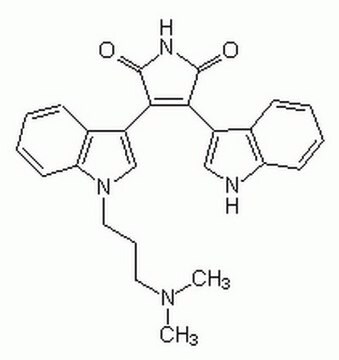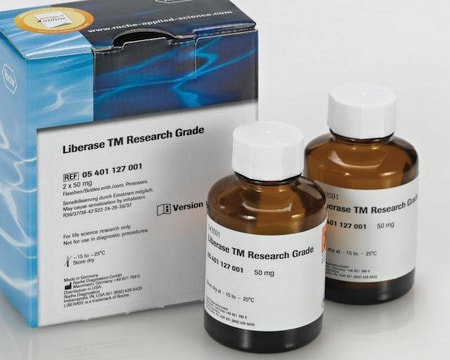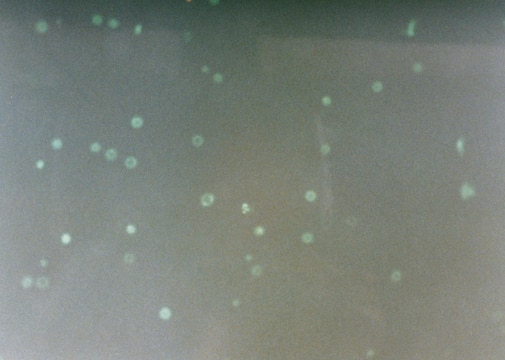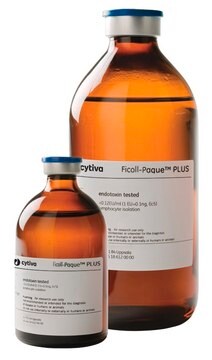V9764
Anti-VPS34 antibody produced in rabbit
~1.0 mg/mL, affinity isolated antibody, buffered aqueous solution
别名:
Vps34 Antibody, Vps34 Antibody - Anti-VPS34 antibody produced in rabbit, Anti-PIK3C3, Anti-Phosphoinositide-3-kinase, Anti-Vacuolar protein sorting 34
登录查看公司和协议定价
所有图片(2)
About This Item
分類程式碼代碼:
12352203
NACRES:
NA.41
推荐产品
生物源
rabbit
共軛
unconjugated
抗體表格
affinity isolated antibody
抗體產品種類
primary antibodies
無性繁殖
polyclonal
形狀
buffered aqueous solution
分子量
antigen ~105 kDa
物種活性
mouse, rat, human
濃度
~1.0 mg/mL
技術
indirect immunofluorescence: suitable
western blot: 2-4 μg/mL using whole extracts of HEK-293T cells expressing human VPS34
UniProt登錄號
運輸包裝
dry ice
儲存溫度
−20°C
目標翻譯後修改
unmodified
基因資訊
human ... PIK3C3(5289)
mouse ... Pik3c3(225326)
rat ... Pik3c3(65052)
一般說明
Vacuolar protein sorting 34 (VPS34), also known as phosphatidylinositol 3-kinase catalytic subunit type 3 (PIK3C3), is encoded by the gene mapped to human chromosome 18q12.3. The encoded protein belongs to the phosphoinositide (PI)-3-kinase family. VPS34 is widely expressed in all tissues of mammals.
免疫原
synthetic peptide corresponding to amino acids 22-34 of human VPS34, conjugated to KLH via an added cysteine residue. The corresponding sequence is identical in mouse and rat.
應用
Anti-VPS34 antibody produced in rabbit has been used in immunoblotting.
生化/生理作用
Vacuolar protein sorting 34 (VPS34) is a lipid kinase that phosphorylate phosphatidylinositol (PtdIns), to form phosphatidylinositol 3 phosphate (PtdIns3P). VPS34 plays a vital role in various intracellular trafficking events such as autophagy and phagosome formation. Thus, the inhibition of kinase activity of Vps34 might be considered as a potential therapeutic method for cancer treatment. VPS34 is also involved in internal vesicle formation within multivesicular endosomes, reverse transport of endosome to Golgi apparatus and membrane transport from the outer nuclear membrane towards the cell periphery. Mutation in the gene encoding VPS34 is associated with pathogenesis of schizophrenia. VPS34 plays an essential role in nutrient/amino acid induced activation of mechanistic target of rapamycin (mTOR) signaling in cultured cells and it also facilitates early embryogenesis and cell proliferation.
標靶描述
VPS34 is known to be involved in endocytosis and vesiculartrafficking.
外觀
0.01M 磷酸缓冲盐溶液,pH 7.4,含 15mM 叠氮化钠。
免責聲明
Unless otherwise stated in our catalog or other company documentation accompanying the product(s), our products are intended for research use only and are not to be used for any other purpose, which includes but is not limited to, unauthorized commercial uses, in vitro diagnostic uses, ex vivo or in vivo therapeutic uses or any type of consumption or application to humans or animals.
未找到合适的产品?
试试我们的产品选型工具.
儲存類別代碼
10 - Combustible liquids
水污染物質分類(WGK)
WGK 2
閃點(°F)
Not applicable
閃點(°C)
Not applicable
個人防護裝備
Eyeshields, Gloves, multi-purpose combination respirator cartridge (US)
The phosphoinositide (PI) 3-kinase family.
Fiona M Foster et al.
Journal of cell science, 116(Pt 15), 3037-3040 (2003-06-28)
Ruqi Tang et al.
Neuroscience letters, 437(1), 42-44 (2008-04-19)
The PIK3C3 gene has been implicated as a candidate gene for schizophrenia by functional evidence and genetic association studies. A series of previous studies have found susceptibility SNPs in promoter region. To further verify its susceptibility to schizophrenia in the
Xiang Zhou et al.
PloS one, 6(1), e16358-e16358 (2011-02-02)
The Pik3c3 gene encodes an 887 amino acid lipid kinase, phosphoinositide-3-kinase class 3 (PIK3C3). PIK3C3 is known to regulate various intracellular membrane trafficking events. However, little is known about its functions during early embryogenesis in mammals. To investigate the function
Benoit Pasquier et al.
Journal of medicinal chemistry, 58(1), 376-400 (2014-11-18)
Vps34 (the human class III phosphoinositide 3-kinase) is a lipid kinase involved in vesicle trafficking and autophagy and therefore constitutes an interesting target for cancer treatment. Because of the lack of specific Vps34 kinase inhibitors, we aimed to identify such
Elma Aflaki et al.
Aging cell, 15(1), 77-88 (2015-10-22)
Gaucher disease, the inherited deficiency of lysosomal glucocerebrosidase, is characterized by the presence of glucosylcer-amide macrophages, the accumulation of glucosylceramide in lysosomes and the secretion of inflammatory cytokines. However, the connection between this lysosomal storage and inflammation is not clear.
我们的科学家团队拥有各种研究领域经验,包括生命科学、材料科学、化学合成、色谱、分析及许多其他领域.
联系技术服务部门







